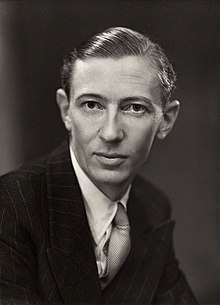The Lord Carr of Hadley | |||||||||||||||||||||||||||||||||||
|---|---|---|---|---|---|---|---|---|---|---|---|---|---|---|---|---|---|---|---|---|---|---|---|---|---|---|---|---|---|---|---|---|---|---|---|
 Formal portrait, 1951 | |||||||||||||||||||||||||||||||||||
| Shadow Chancellor of the Exchequer | |||||||||||||||||||||||||||||||||||
| In office 4 March 1974 – 11 February 1975 | |||||||||||||||||||||||||||||||||||
| Leader | Edward Heath | ||||||||||||||||||||||||||||||||||
| Preceded by | Denis Healey | ||||||||||||||||||||||||||||||||||
| Succeeded by | Geoffrey Howe | ||||||||||||||||||||||||||||||||||
| |||||||||||||||||||||||||||||||||||
| |||||||||||||||||||||||||||||||||||
| Personal details | |||||||||||||||||||||||||||||||||||
| Born | Leonard Robert Carr 11 November 1916 North Finchley, Middlesex, England | ||||||||||||||||||||||||||||||||||
| Died | 17 February 2012 (aged 95) Alderley Edge, Cheshire, England | ||||||||||||||||||||||||||||||||||
| Political party | Conservative | ||||||||||||||||||||||||||||||||||
| Spouse |
Joan Twining (m. 1943) | ||||||||||||||||||||||||||||||||||
| Children | 3 | ||||||||||||||||||||||||||||||||||
| Education | Westminster School | ||||||||||||||||||||||||||||||||||
| Alma mater | Gonville and Caius College, Cambridge | ||||||||||||||||||||||||||||||||||
Leonard Robert Carr, Baron Carr of Hadley, PC (11 November 1916 – 17 February 2012) was a British Conservative Party politician who served as Home Secretary from 1972 to 1974. He served as a Member of Parliament (MP) for 26 years, and later served in the House of Lords as a life peer.
Leonard Robert Carr was born in North Finchley on 11 November 1916.[1] He was educated at Westminster School[2] and Gonville and Caius College, Cambridge, where he read Natural Sciences, graduating in 1938. After graduation he applied his knowledge of metallurgy at John Dale & Co, the family metal engineering firm.[2] A collapsed lung kept him from war service but his firm specialised in the construction of airframes for Lancaster bombers.[3]
In 1943, Carr married Joan Twining, and they had a son and two daughters. Their son, David, died in a traffic accident in 1965.[1]
Carr first sought the Conservative nomination in Barnet ahead of the 1950 election, but lost to Reginald Maudling.[1] He was instead elected Member of Parliament for Mitcham in 1950 and served there until 1974, when the seat was merged and he moved to Carshalton.[1] He was a parliamentary private secretary to Anthony Eden from to 1951 to 1955, and a parliamentary secretary to the labour ministry after Eden became prime minister.[1]
Carr was a supporter of the European Economic Community, and was amiable to Edward Heath's election as Conservative Party leader in 1965, even though he had supported Maudling.[1] When Heath became prime minister in 1970, he served as Secretary of State for Employment and was responsible for the modernising Industrial Relations Act 1971, which balanced the introduction of compensation for unfair dismissal with curbs on the freedom to strike and the virtual abolition of closed shop agreements. The Industrial Relations Act 1971 was deeply disliked by, trade unions, whose industrial action lead to the three-day week and ultimately to the defeat of the government.[1] The victorious Labour Party promptly repealed the Industrial Relations Act and replaced it with the Trade Union and Labour Relations Act 1974, which scrapped the "offensive" provisions but effectively re-enacted the remainder of Carr's 1971 Act.
In 1971, Carr escaped injury when The Angry Brigade anarchist group exploded two bombs outside his house.[4] More than thirty years later, a member of the group issued a public apology to Carr and sent him a Christmas card.[5]
In 1972, Carr served a brief period as Lord President of the Council and then was appointed Home Secretary following Reginald Maudling's resignation. Following Heath's defeat in the first ballot of the 1975 Conservative leadership contest, he asked Carr to "take over the functions of leader" until a new leader was elected.[6] The day after her election the new leader, Margaret Thatcher met with Carr, according to her at his request, before she formed shadow cabinet. According to her memoirs, Carr had been close to Heath and so she would have understood "if he did not relish the prospect of serving under" her. She stated that Carr made it clear that the only post that he would accept would be that of Shadow Foreign Secretary. She told him that she could not promise that and confided in her memoirs that at that stage, she was still considering appointments and was "not convinced" that she would offer Carr any role in the shadow cabinet. She proceeded to appoint Maudling as Shadow Foreign Secretary and saw Carr again later to inform him of her decision. In her memoirs, she speculated that Carr might have been "persuaded to stay in another capacity" but did not offer him the chance and noted, "I was not keen to have another strong opponent in any position on the team".[7]
In 1975, Carr co-founded the Tory Reform Group.[1]
Carr was created a life peer as Baron Carr of Hadley, of Monken Hadley in Greater London, in 1976.[8] He served on the board for a number of companies, including Cadbury Schweppes, Prudential Assurance (which he chaired from 1980 to 1985), and Securicor.[1] From 1985 to 1986, he was president of the Surrey County Cricket Club.[1]
Carr died from bronchopneumonia at a nursing home in Alderley Edge, Cheshire, 17 February 2012, at the age of 95.[1] His body was buried in the graveyard of St. Peter's Church, in the Gloucestershire village of Farmington. He was survived by his wife, Joan, and two daughters.[9]